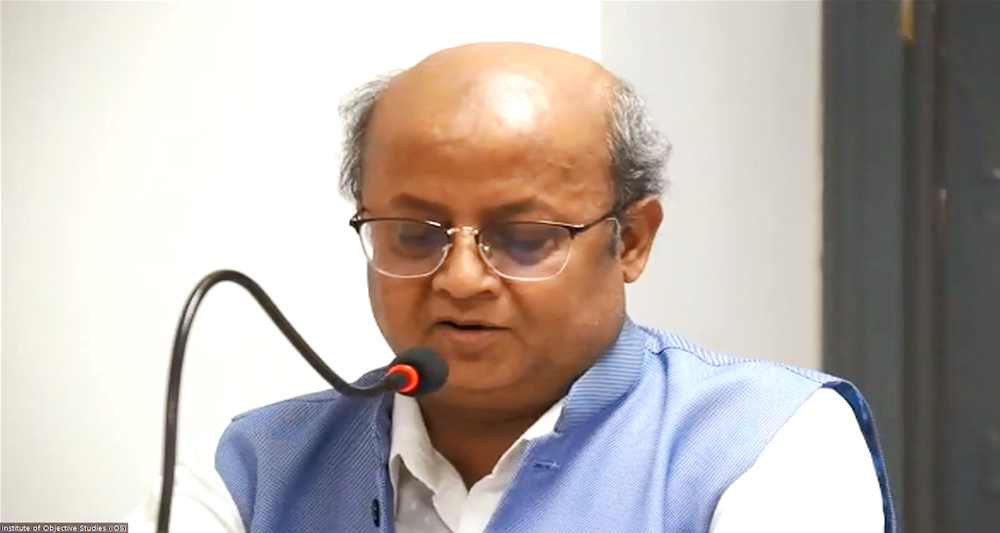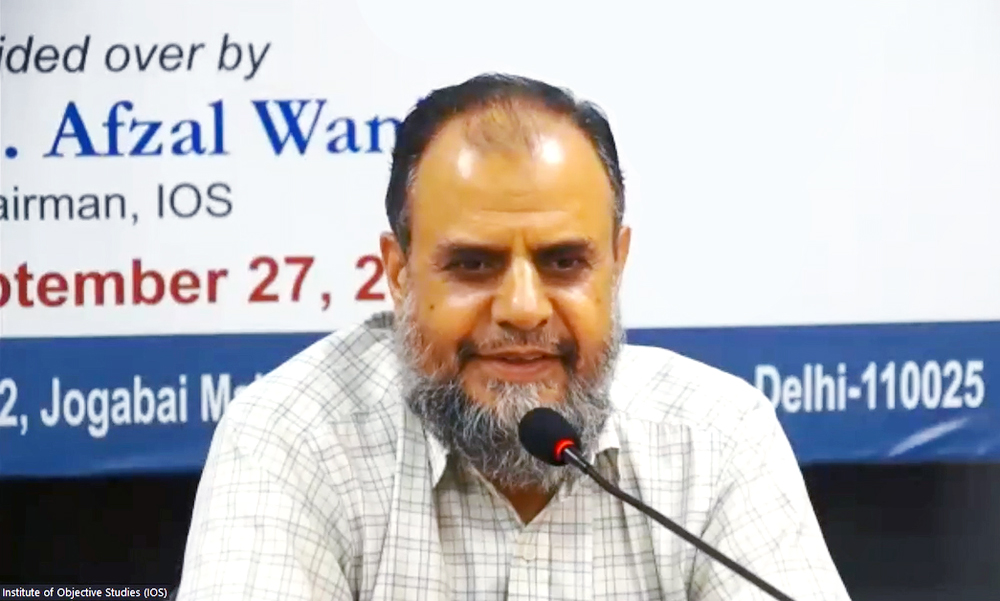IOS Lecture on Artificial Intelligence (AI) Revolution: Shaping Tomorrow
.jpeg)
IOS Lecture on Artificial Intelligence (AI) Revolution: Shaping Tomorrow
New Delhi: A lecture on Artificial Intelligence (AI) Revolution: Shaping Tomorrow was organized by the Institute of Objective Studies (IOS) in hybrid mode on September 27, 2024. Nilanjan Das, group creative editor, India Today Group, design head, data Intelligence Unit and chief creative editor, CUT and Creator for World first AI new Anchor ‘Sana’ was the speaker who explained the niceties of the AI.
The lecture began with the recitation of a Qur’anic verse by Network Administrator, IOS, Mansoor Ahmad.

Introducing the topic, Secretary General of the IOS, Mohammad Alam, said that the lecture was most significant. Briefly speaking about Nilanjan Das he held the former was an expert in the field which had become an important tool to obtain quick results. Referring to the activities of institute, he noted that its focus had always been on socio-economic issues. Marginalized sections and the minorities had been subjects of study and evaluation. The institute regularly organizes symposia, seminars and discussions on the public policy issues. Organizing national and international seminars is a regular feature of the institute. The proceedings of programs are published by the institute in book form. It has so far published about 500 titles. At the institute, we believe in “Think and work together”, he added.

Speaking on the subject, Nilanjan Das said that as an early AI adopter, he leveraged its transformative power across the world. He noted that traditional computers would be governed by the AI within a year. He explained how the AI would design tomorrow. “It is a tool, rather a brilliant tool. There are unlimited possibilities and it will put single technology into practice”. Referring to AI images and covers, he said it creates visual images and it has to be done quickly. There is no camera involved and it is done automatically. Earlier, photo creators used to take 15 days, but now it was done in one hour. Two years ago also it was so. It created layers and layers of image. Commenting on the AI video, he noted that after the introduction of AI, everything was quick. We can create something out of nothing. As a trailblazer, we changed image with different expressions, he added.
Nilanjan Das observed that key sectors like media, education, health and technology were transforming at an unprecedented pace. “In media, AI is reshaping content creation and audience engagement, enabling hyper-personalized experiences. In education, it offers intelligent tutoring systems and adaptive learning tools that cater to diverse student needs. Healthcare is experiencing breakthroughs with AI-driven diagnostics, personalized medicine and predictive analytics, improving patient outcomes. In the tech sector, AI is pushing the boundaries of innovation, automating complex processes and driving advancements in fields like robotics, cyber security and software development. Together, these shifts are shaping a future driven by intelligent systems”, he held. ‘Sana’ the AI version of the anchor had been created and TV news channel Aaj Tak had become fastest in India in this respect. He noted that the Group was busy in upgrading a more advanced one which would be its next version. The group was also engaged in creating an emotion-based version. New version would have more reflections, he said.
Nilanjan Das pointed out that AI music was very interesting. Working on the music version, one need not create an orchestra or musical instruments. There was music and songs and news broadcast music. He said that the creation of MIT Management Revolution Ping was an AI revolution. Crazy people were doing it now. Commenting on the role of AI in primary and secondary education, he held that AI-driven system assessed students, levels and learning styles. It also created customized lesson plans that targeted individual strengths and weakness. Then come online gaming. He said that AI-powered tutoring systems and virtual assistants enhanced engagement. AI automated grading, attendance and lesson planning and enabled teachers to focus on students’ interaction. AI provided universities with insights. AI-powered platforms also enable d remote learning, expanding access to education. Referring to specialized learning and life-long learning, he said that there were AI-powered internships and practical experiences. There was continuous upskilling with the AI. He held that the AI offered a lot of jobs, increased efficiency and enhanced decision-making.
Further, Nilanjan Das focused on negative aspects of AI and said that it led to job displacement. It also created skill gaps and increased surveillance. Automation could replace routine jobs in sectors like manufacturing, retail and administrative roles leading to unemployment and inequality. As far as the positive aspects are concerned, they bring precision in medicine and ensure efficient healthcare. It is also helpful in early detection of diseases. Use of Robotics in surgery has been made possible by the AI. Similarly, expansion of telemedicine has become a reality today due to the application of AI. It has enhanced user experience. Collaboration in development and improved communication are other positive aspects of AI, he concluded.

In his presidential remarks, the Chairman of the IOS, Prof. M. Afzal Wani, observed that knowledge was something that never ended. “There is action and action turns into project. We are bound to go with AI at this age. There cannot be any law to stop it. There are lots of benefits. AI is more reliable than human perception”, he said. He warned that AI could also be misused as a knife was misused. He also referred to robotic technology which helped reach the level of precision. He advised, “First record the actions that are harmful. Robot can stand during all seasons. It is more reliable than human mind. It may also signal that the officers are wrong. It is yet to be used in a big way because only about two percent people in India are AI literate. AI and human environment have to co-exist”. He opined that power would come through technology. He asked to look to technology which was useful for teachers and judges. AI can be used in governance, teaching, administration, public distribution system, banking, business etc., in a better way. Humanity has a better chance. AI should be learnt by everyone, he stressed.
At the end of the lecture, Prof. Wani extended a vote of thanks to the attendees.
Go Back